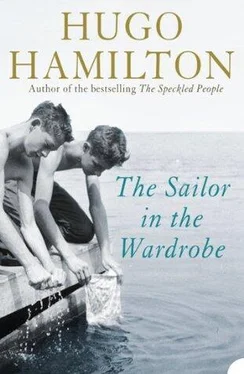When my father was studying engineering in Dublin and all the students were sitting in a lecture room in UCD waiting for the professor one day, there was an argument about Britain and Ireland, about Irish soldiers fighting for the Queen, about flags and languages, about a United Ireland and about Irish neutrality. Everybody was throwing everything they had into the debate and speaking at the same time. Some of them had their feet up on the desks, smoking cigarettes and saying it was a waste of time speaking about anything other than women and whiskey and emigration. My father called them cowards. He was good at mathematics and able to think sideways, so he took them all on and kept them silent for a moment with his ideas.
He told the other students that the Irish had to stop running away and start thinking with their heads in future. Some of them agreed and said the only thing holding Ireland back was the situation in the North of Ireland and the fact that the post-boxes were still red up there. Some said it could only be solved with blood. Others said it was pointless and that the heroes of 1916 died for nothing, just to change the colour of the post-boxes in the south to green. The students with their feet up said the problem was that Irish women never took off their clothes until they were married. And then came the big storm in the lecture room, when somebody made a remark about women wearing black shawls over their heads in Ireland and how that was what kept the Irish going backwards when all the women in England and France were now wearing headscarves and stockings instead.
Everybody laughed except my father. His mother, Mary Francis, wore a shawl. She was photographed in her shawl along with two other women also wearing shawls on the street in Leap, West Cork, by the famous photographer, Father Browne. My father got up very suddenly from where he was sitting. He picked up the steel chair and flung it across the room. He didn’t tell anyone why he had decided to do this and they didn’t know what secret thing in his head made him so mad. They must have thought the chair had conducted a massive charge of electrical energy, like a Van de Graaff generator underneath him. My father must have been surprised himself by the amount of noise the chair made clattering across the wooden floor. I don’t know where he got the idea from, but he picked up another chair and threatened to kill everyone with it. The students took their feet down off the desks and fled with their backs up against the window, begging for mercy.
My father stood there with a wild look in his eyes. I’ve seen it many times myself when his eyes are like hard brown full-stops inside his round glasses, when his mouth is tight with rage and his ears are on fire. He’s small and has a limp, but he gets so serious and so angry at the sound of his own words that everybody is afraid of what he might do. The students knew that he could be overpowered easily and that he was not very good at fighting, even with a chair in his hands. But he was good at losing his temper and not telling anyone why. So they began to talk to him and to ask him what it was that made him so furious. They were dumbfounded to find out that it was the Irish shawl and not something much more important like asking Britain for war reparations or keeping Irish people at home and stopping them from emigrating and working for Britain. They said there was no offence intended to him or to anyone in Ireland who still wore shawls, and slowly my father let the chair down again and everybody shook hands. Somebody picked up the chair lying on the floor, and after that, they were careful because they said my father was sensitive and had a short fuse and could lose his temper at the drop of a hat.
I didn’t know about any of this at the time when I picked up a chair one day and threw it at my mother. There was an argument in the kitchen one morning about going out without clearing the table and I got angry with her. I couldn’t get her to agree with me, so I picked up a chair to kill her. I didn’t really want to hurt her, just to frighten her. She said she had been frightened by worse things than chairs, so I threw it across the floor of the kitchen. She didn’t pick it up or say much, except that flying chairs would never make her change her mind, no more than flying words would ever persuade anyone to agree with me. She said she would leave the chair where it landed. For ever. It was going to be like a monument to the uselessness of anger. Everybody passing by would know by the chair lying on its side that somebody had failed to convince the world. The flying chair of lost arguments, she called it. So I picked it up again. We shook hands and it was all over. But I realized that I had become like my father inside. He invented the idea of picking up chairs because people were not listening, and the only thing that would make them take notice was the sight of something unusual, like a chair upside down in the air with nobody sitting on it. I could no longer avoid being like my father, no more than Stefan can avoid being his. I am a chair-thrower for Ireland and I wonder what I will do next.
Maybe it’s a kind of father-and-son trap. No matter how much I try to be the opposite, I will still end up like my father. It’s how evolution works, with every son slipping into his father’s shoes, no matter how different your clothes are or how long your hair is or how different the music is you’re listening to. All my friends will go like their fathers even if they don’t go bald or wear glasses, because fathers and sons are not a line of separate individuals, as far as I can see. It’s more like a chain of unfinished people, with each son improving things or making things even worse. A long line of fathers and sons heading into the future, all the way into infinity. Sons going backwards and sons going forwards and sons that are no better and no worse than their own fathers. I know we will be held accountable, not for what we do ourselves, but for what happened in the time of our parents, because it takes that long before people can look back to see what really went on and turn it into history. We are the ones who go on trial for what the people before us did.
One day, my father and his friends invaded Northern Ireland. Before he was married, he was politically active and belonged to a party which decided to invade the six counties which were still under British Rule. The leader of the party was Gearóid, a great friend who must have been like Packer for me, somebody who was able to make up a story for everyone around him, making speeches and inventing the future. It was a cultural movement that would reawaken the Irish people. The Irish language would give the people back their strength and courage. The Irish language is what would stop people going hungry and emigrating to America.
I sometimes think about the way my mother and father must have been on trains at the same time. I can’t help thinking of them before they ever met each other, on trains going in very different directions, in different countries. My father sitting on a train to Belfast with his friends and my mother sitting alone on a train to Mainz. Him going up to persuade the people of Northern Ireland who wanted to remain with Britain, that they were making a big mistake. Her on the way to a city that was destroyed by the bombing. Him going to the city where the bombs were now starting to go off and her going to a city where there was not much more left to be destroyed. It’s funny to think of them not knowing each other at all. Funny to think of a time when they would have walked past each other in the street and not even looked at each other, because they were both thinking only of the things they had to do for their country. Germany and Ireland were so far away from each other at that time. But they come together inside my head. They are not separate countries any more, because my father and mother got married and I have mixed up Irish history and German history so much that it’s all the same place now.
Читать дальше
Конец ознакомительного отрывка
Купить книгу












